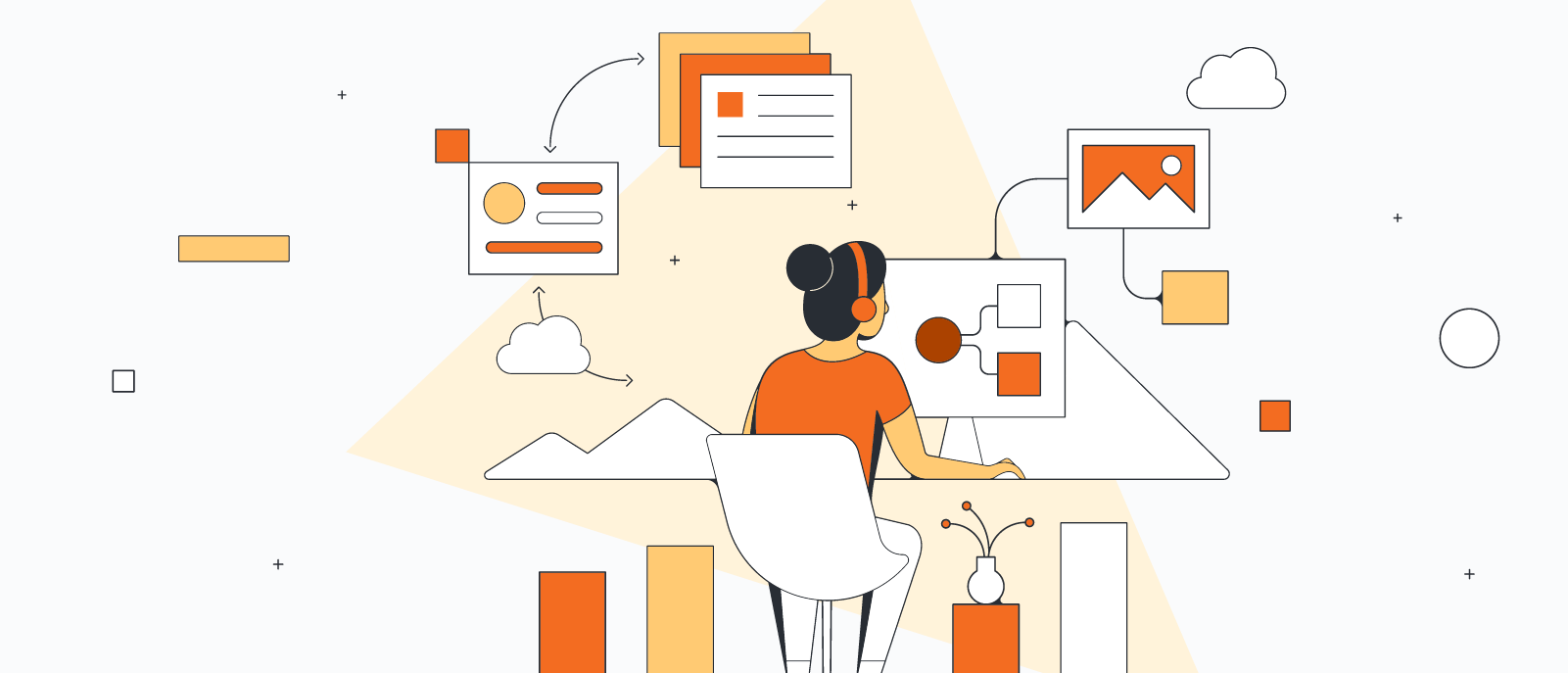
Program management 101: What is a program manager?
Reading time: about 6 min
Topics:
This blog post covers:
Though a program manager may sound like another name for a project manager, the two roles are distinct. In this post, learn what a program manager does and why they are so important for your business’s success.
Program manager vs project manager
Before we can understand program management, we have to distinguish projects and programs.
Project: A project is a temporary undertaking focused on achieving specific short-term goals (e.g., creating or updating a product or service). Projects are time-bound with clear start and end points. Project tasks are functional and tactical in nature.
Program: In contrast, a program consists of multiple related projects that complement and build on each other towards achieving one or more long-term business goals or benefits. Program tasks are strategic in nature.
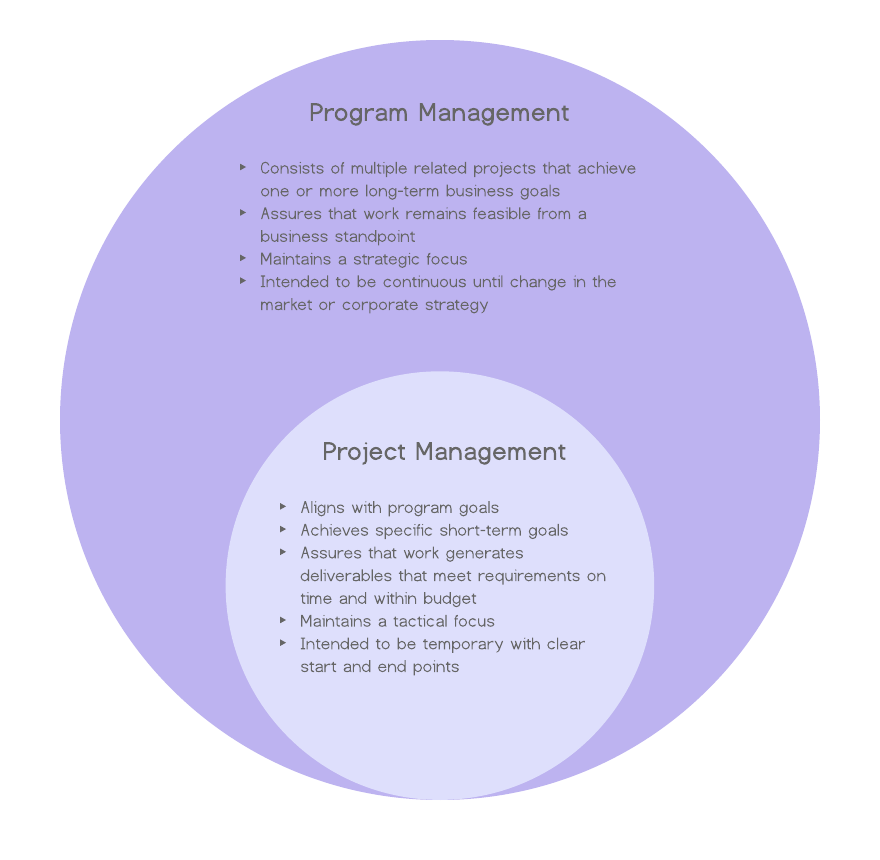
What is program management?
Let’s examine what program management is and why it’s necessary.
At its most basic definition, program management is the application of the skills, knowledge, tools, and techniques needed to achieve a program’s objectives and requirements.
But that’s pretty vague.
Remember that a program consists of a collection of interconnected projects. Program management is about the big picture. It's about coordinating these smaller initiatives and efforts to realize the long-term objectives of the program.
Program management is where operational and project management meet.
The importance of program management
So why do we need program management? Simply put: the scale and complexity of a program requires a dedicated, high-level manager to oversee its many moving parts and strategically coordinate those individual initiatives.
As with any large or complex project, without a strategic plan and careful management of resources, talent, constraints, and risk, the project will fall apart and the objectives will remain out of reach.
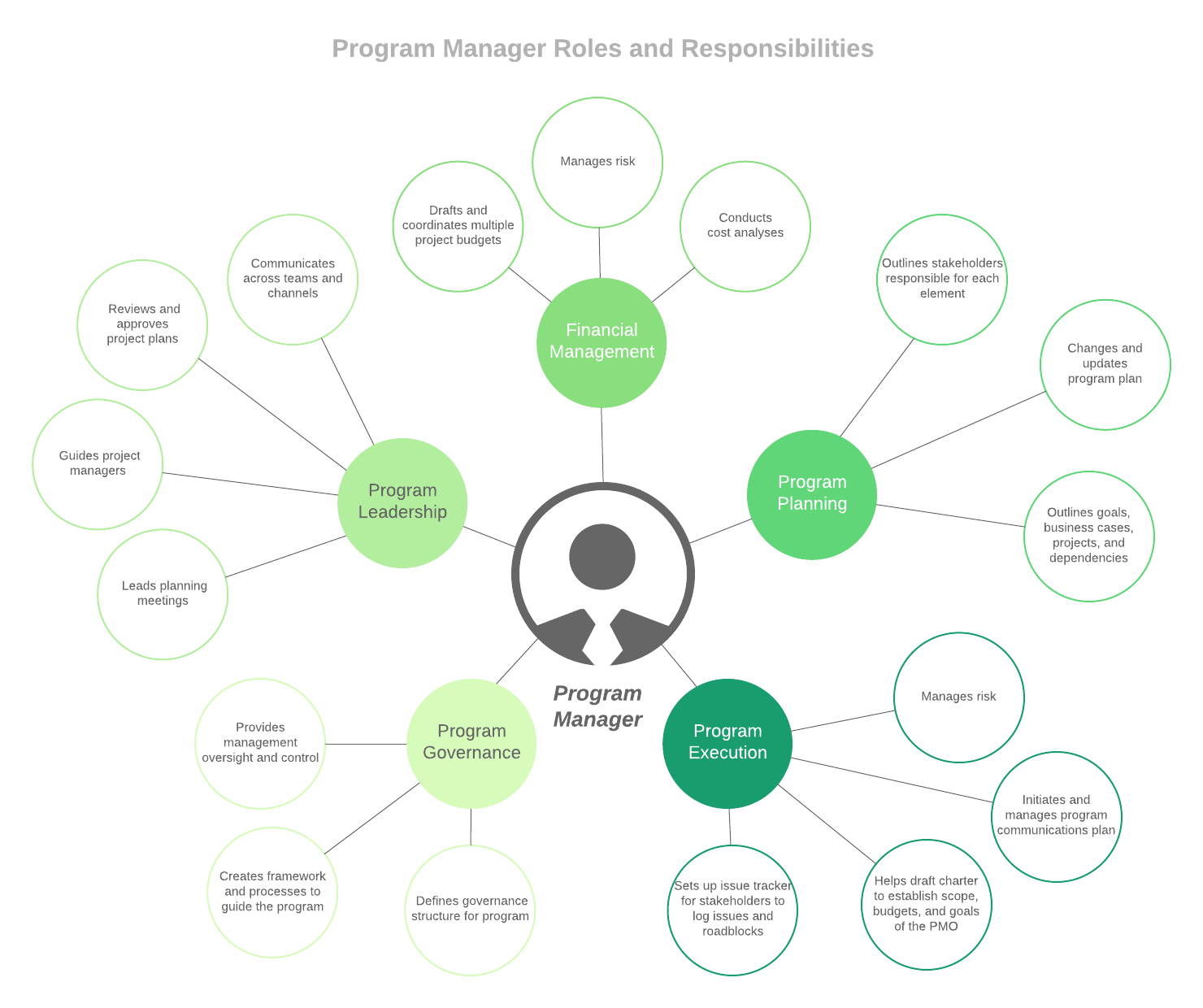
What is a program manager?
A program manager oversees, guides, and promotes coordination between project managers within a specific program. They manage the interdependencies between projects within their program and handle escalated issues that are outside the scope of the project managers. They are responsible for program governance, program leadership, financial planning, program planning, and program execution.
Among other things, the program manager’s responsibilities involve:
- Aligning schedules
- Managing and allocating resources
- Identifying and mitigating risk
- Establishing and monitoring a program management office
Program manager roles and responsibilities
Program governance
The program manager is responsible for defining the governance structure for the program. Program governance includes the framework and processes that will guide the program and provide management oversight and control.
This is a crucial component of the program manager’s responsibilities because, without clear governance, the complexity of the program (and its many moving parts) can derail the program and cause significant loss (in time, resources, costs, etc.).
Program leadership
A program manager is essentially a senior-level leader. In that capacity, they are responsible for a number of leadership tasks such as:
- Leading planning meetings
- Guiding project managers
- Reviewing and approving project plans
- Communicating across teams and channels
The program manager acts as the point person and liaison for program initiatives. As such, they are responsible for communicating with and connecting project and program stakeholders to the right people and resources.
Part of their communication strategy may include a stakeholder analysis. This useful document keeps track of all relevant stakeholders (both internal and external) and helps the program manager ensure all parties receive the information they need when they need it.
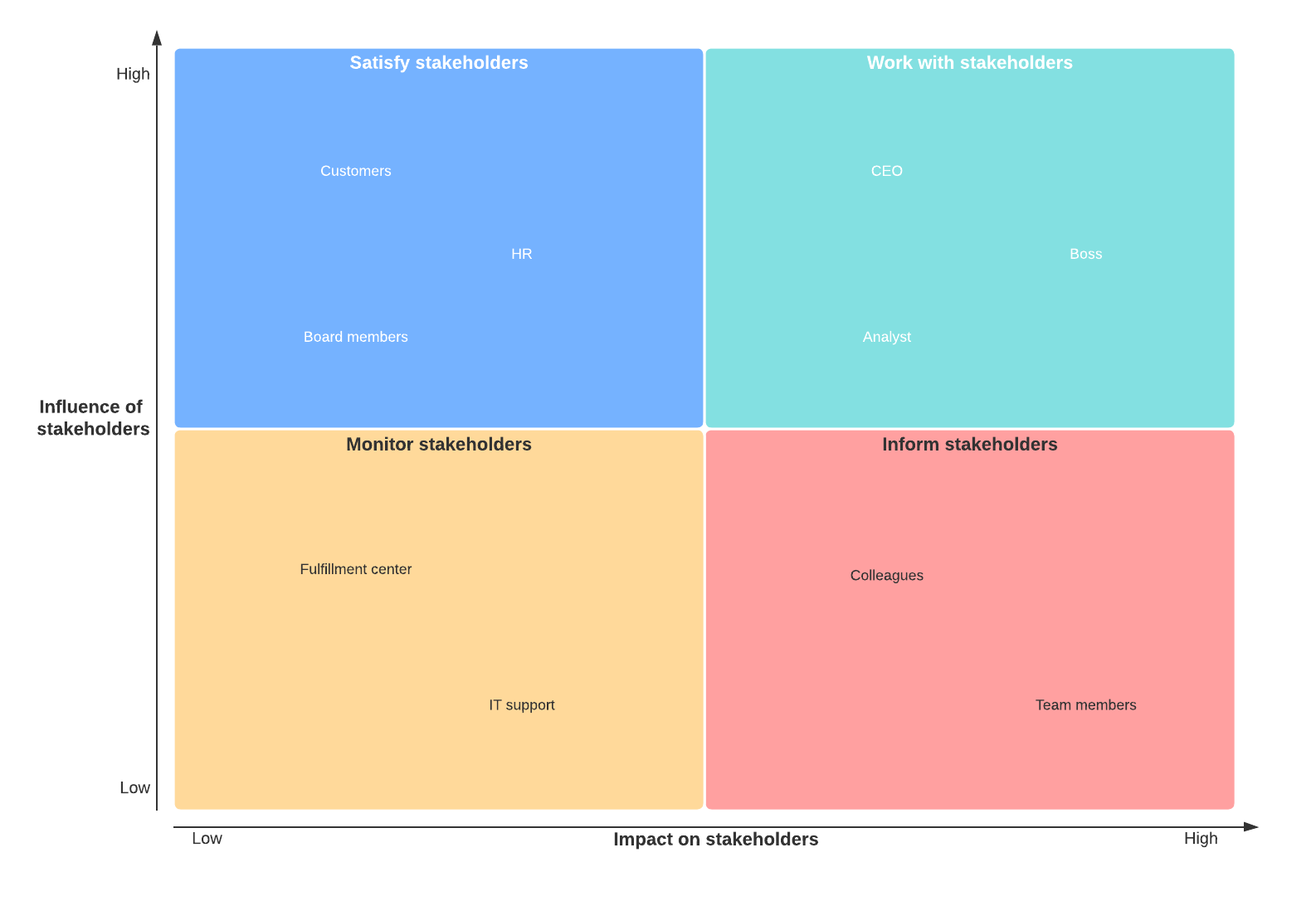
Financial management
With so many projects, there are numerous financial costs and concerns to manage and coordinate. The program manager should work with senior leadership, including the CFO, to ensure the program stays on track financially. This role may involve drafting and coordinating multiple project budgets, managing risks, and conducting cost analyses.
Program planning
A cornerstone of the program manager’s job is planning the program itself. A program plan is a comprehensive and strategic playbook for the entire program. The plan should outline the goals and business case for the program, all the projects within the program, the stakeholders responsible for each element (e.g., schedules, deliverables, deadlines, etc.) and dependencies.
The program plan is typically an iterative document that the program manager can change and update as needed over the course of the program.
Program execution
Executing the program is the culmination and ongoing implementation of the program manager’s responsibilities.
In addition to creating and implementing governance, communications, and program plans, the manager will also oversee risk management, procurement, project tracking, training management, financial management, and continued program steering and strategy.
Within these areas of focus, successful programs typically contain the following elements and tools that the program manager should initiate and manage.
- PMO charter
- Program governance plan
- Program communications plan
- Stakeholder analysis
- Program plan
- Issue tracker
A program management office (PMO) is a program support team that helps the program manager execute the program strategy and initiatives. A PMO charter is a document that establishes the scope, budget, and goals of the PMO and defines the pillars of the program that the team can measure progress against.
An issue tracker is a valuable tool in the program manager’s toolbox. It is typically a shared file where stakeholders can log their issues and roadblocks, update past issues, and communicate on project progress. Maintaining a clear and updated issue tracker helps the program manager keep the program running smoothly.
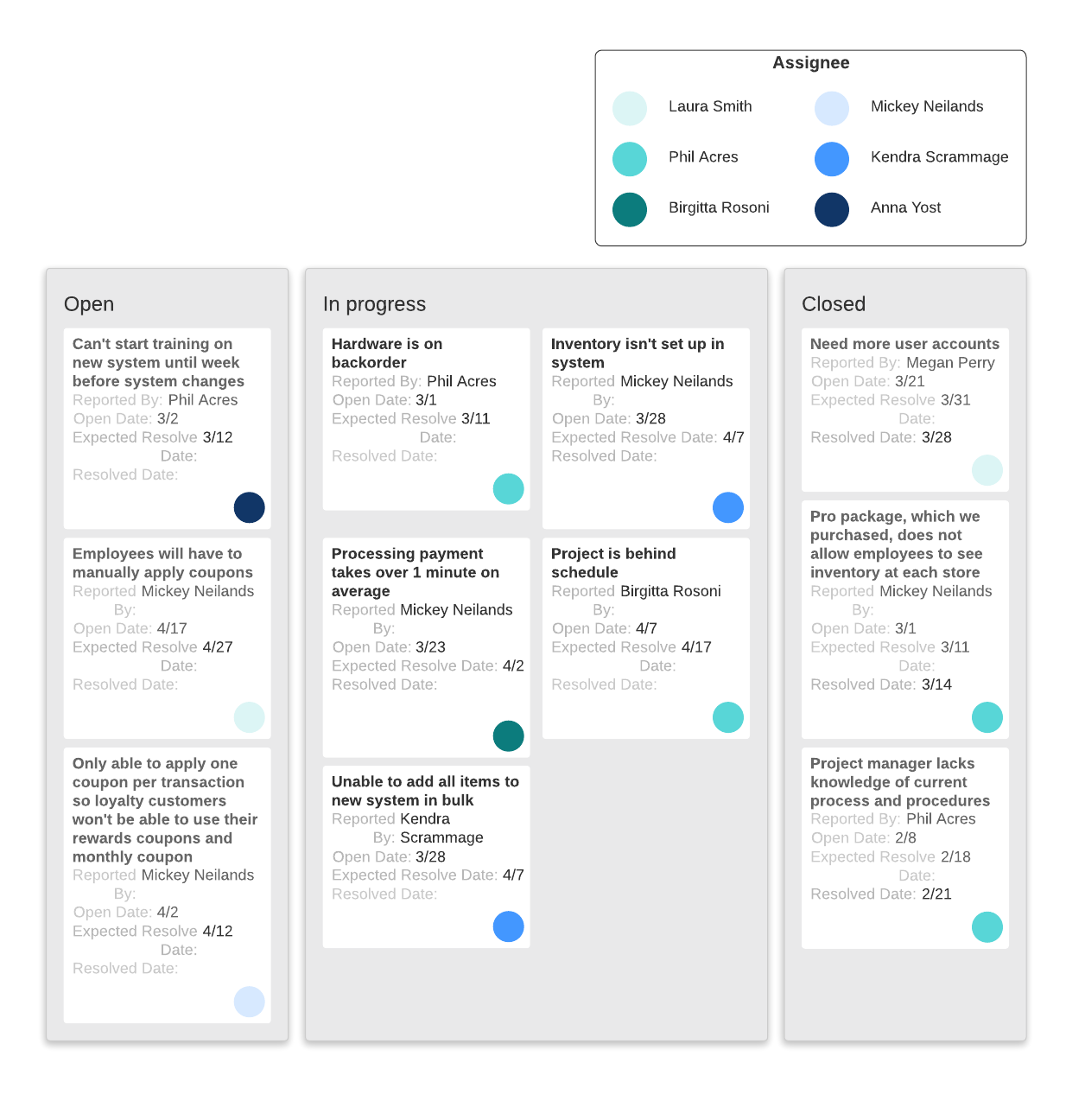
Using Lucidchart for effective program management
Managing a program is an enormous and complex job. The program manager not only has to be skilled in leadership and communications, but they need strong competency in project management methodologies, financial management, and strategic planning and analysis.
In other words, they have a lot of things to juggle.
Keeping tabs on all these moving parts and processes is a challenge. Luckily, Lucidchart can help. Lucidchart is a visual workspace that helps program managers document and track processes, plans, issues, and stakeholders in one convenient place.
Managers can create custom project dashboards to track each project. Data linking makes it easy to create dynamic dashboards that track performance metrics, issues, and progress so you can get at-a-glance insights into each project’s status.
Additionally, Lucidchart templates do the heavy lifting for busy managers who need a quick process flow or roadmap. Fill in your project plans and outline processes at the click of a button. Conditional formatting and various design options give managers the flexibility they need to make custom program plans that work for them.
Of course, at the end of the day, the most important feature for a program manager is communication. With Lucidchart, you can communicate and collaborate anytime, anywhere. Documents update in real time so every team member and stakeholder can see up-to-date, accurate information. Never worry about changes or updates getting lost in the shuffle again.

Lucidchart offers dozens of templates that can help program managers.
Vorlagengalerie durchsuchenAbout Lucidchart
Lucidchart, a cloud-based intelligent diagramming application, is a core component of Lucid Software's Visual Collaboration Suite. This intuitive, cloud-based solution empowers teams to collaborate in real-time to build flowcharts, mockups, UML diagrams, customer journey maps, and more. Lucidchart propels teams forward to build the future faster. Lucid is proud to serve top businesses around the world, including customers such as Google, GE, and NBC Universal, and 99% of the Fortune 500. Lucid partners with industry leaders, including Google, Atlassian, and Microsoft. Since its founding, Lucid has received numerous awards for its products, business, and workplace culture. For more information, visit lucidchart.com.
Related articles
8 steps to build a project management timeline
Project management timelines provide a visual overview of projects and increase team efficiency. Learn 8 easy steps to build a project management timeline to perfection.
